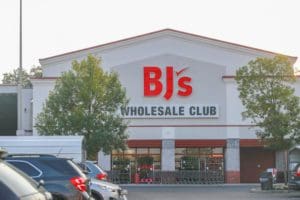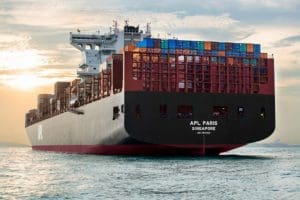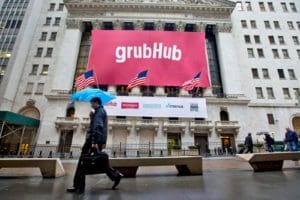 According to recent research, the “Great Pacific Garbage Patch” may be significantly larger than previously thought? Just how big is it? Well, the plastic waste floating in the Pacific Ocean between California and Hawaii contains at least 79,000 tons of material spread over 1.6 million square kilometers. That’s the equivalent mass of 6500 school buses, and about the size of Mongolia or Iran. About 1.8 trillion plastic pieces make up the garbage patch, the scientists estimate, with much of that plastic coming from humans’ ocean activities, such as abandoned fishing nets and gear and lost shipping containers and/or their contents. These plastics contain especially durable plastics, such as polyethylene and polypropylene, which are designed to survive in marine environments. That is certainly a sobering thought to know that much waste is just floating out there. And now, on to this week’s logistics news.
According to recent research, the “Great Pacific Garbage Patch” may be significantly larger than previously thought? Just how big is it? Well, the plastic waste floating in the Pacific Ocean between California and Hawaii contains at least 79,000 tons of material spread over 1.6 million square kilometers. That’s the equivalent mass of 6500 school buses, and about the size of Mongolia or Iran. About 1.8 trillion plastic pieces make up the garbage patch, the scientists estimate, with much of that plastic coming from humans’ ocean activities, such as abandoned fishing nets and gear and lost shipping containers and/or their contents. These plastics contain especially durable plastics, such as polyethylene and polypropylene, which are designed to survive in marine environments. That is certainly a sobering thought to know that much waste is just floating out there. And now, on to this week’s logistics news.
- Walmart patents hint at future where its drones tend the farms
- BJ’s Brings Grocery Delivery to East Coast Households
- Ikea to add electric vehicles to customer delivery fleet for its first store in India
- APL, AB InBev, Accenture, Kuehne + Nagel successfully test blockchain for shipments
- Grubhub expands pact with Yelp
- DHL launches “Parcel Metro” to use crowd-sourced and contract couriers
![]() Drones. Drones. Drones. It’s all about drones. Walmart has filed a series of patents that may hint at the company’s long-term drone strategy. Namely, farmers will use its drones to not only spot crop problems, but will also selectively apply chemicals or disperse pollen to bring shoppers the freshest and cheapest food possible. According to the US Patents and Trademark Office, the retailer applied for six patents last year on drones that aim to prevent damage to crops, control pest attacks on farms, and cross-pollinate plants. Considering that groceries make up more than fifty percent of Walmart’s revenue, it is not surprising to see the company move in this direction. The drone technology is geared towards getting food from farms to store shelves faster and cheaper.
Drones. Drones. Drones. It’s all about drones. Walmart has filed a series of patents that may hint at the company’s long-term drone strategy. Namely, farmers will use its drones to not only spot crop problems, but will also selectively apply chemicals or disperse pollen to bring shoppers the freshest and cheapest food possible. According to the US Patents and Trademark Office, the retailer applied for six patents last year on drones that aim to prevent damage to crops, control pest attacks on farms, and cross-pollinate plants. Considering that groceries make up more than fifty percent of Walmart’s revenue, it is not surprising to see the company move in this direction. The drone technology is geared towards getting food from farms to store shelves faster and cheaper.
 BJ’s Wholesale Club is bringing home delivery to the East Coast. The company recently announced an expanded partnership with Instacart to make home delivery available in more markets. Club members will have access to same-day delivery on thousands of items, including deli meats and cheeses, produce, meat, and frozen foods, as well as household staples such as diapers, paper products, nutritional supplements, and pet products. The expanded partnership with Instacart is the latest in BJ’s growing list of digital conveniences for its members. Club members will save 25 percent or more on groceries compared with standard pricing by placing orders for delivery.
BJ’s Wholesale Club is bringing home delivery to the East Coast. The company recently announced an expanded partnership with Instacart to make home delivery available in more markets. Club members will have access to same-day delivery on thousands of items, including deli meats and cheeses, produce, meat, and frozen foods, as well as household staples such as diapers, paper products, nutritional supplements, and pet products. The expanded partnership with Instacart is the latest in BJ’s growing list of digital conveniences for its members. Club members will save 25 percent or more on groceries compared with standard pricing by placing orders for delivery.
Ikea is jumping on the electric vehicle bandwagon. Around 20 percent of Ikea India’s customer delivery fleet for its first store in the country in Hyderabad will comprise of electric vehicles. That number is expected to increase to 40 percent in the second year and 60 percent in the third year of the store’s operations. The company plans to create electric vehicle charging infrastructure too at its Hyderabad store.
 Blockchain technology continues its path toward supply chain prominence. A consortium comprising AB InBev, Accenture, APL, Kuehne + Nagel, and a European customs organization has begun successfully testing a blockchain solution with real shipments to multiple destinations. Rather than the typical scenario where documents are exchanged physically or digitally, the test program is sharing and distributing relevant data using blockchain technology under single ownership principles determined by the type of information. The consortium, which represents typical stakeholders across an international shipment, collaborated to test 12 real shipments, with various destinations, each with different regulatory requirements. The tests confirmed that blockchain can reduce operating costs and increase supply chain visibility.
Blockchain technology continues its path toward supply chain prominence. A consortium comprising AB InBev, Accenture, APL, Kuehne + Nagel, and a European customs organization has begun successfully testing a blockchain solution with real shipments to multiple destinations. Rather than the typical scenario where documents are exchanged physically or digitally, the test program is sharing and distributing relevant data using blockchain technology under single ownership principles determined by the type of information. The consortium, which represents typical stakeholders across an international shipment, collaborated to test 12 real shipments, with various destinations, each with different regulatory requirements. The tests confirmed that blockchain can reduce operating costs and increase supply chain visibility.

In order to compete with its rivals, including UberEats and DoorDash, Grubhub is expanding its partnership with Yelp to deliver meals from over 80,000 US restaurants on the food listing company’s site and app. This finalizes GrubHub’s $288 million acquisition of Yelp’s Eat24 directory that it began last fall. In exchange, Yelp will get an undisclosed cut of every GrubHub order made through its service. The move is aimed at doubling the number of Yelp restaurants that it delivers to; by this logic, as drivers can make multiple deliveries on a single trip, they can cut delivery costs.
And finally, as Clint Reiser wrote about earlier this week, DHL launched a new initiative called “Parcel Metro”, which will create a ‘virtual delivery network’ of local and regional contract couriers and crowd-sourced providers who can provide flexible last mile deliveries. The service is geared towards online retailers to meet the demand for same-day delivery options. The consumers will be able to track shipments in real-time, communicate special instructions to their courier, reschedule a delivery, and rate their delivery experience. According to a statement issued by Deutsche Post DHL Group, the service is now available in Chicago, New York, and Los Angeles, and will be launched in Dallas, Atlanta, San Francisco and Washington DC later in the year.
That’s all for this week. Enjoy the weekend and the song of the week, Only Happy When it Rains by Garbage.

















Leave a Reply